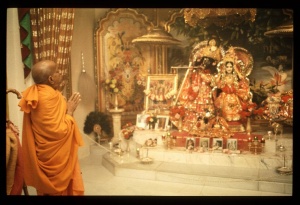SB 6.18.25: Difference between revisions
m (1 revision(s)) |
m (Text replacement - "==== <div class=" to "==== <div class=") |
||
| Line 1: | Line 1: | ||
{{info | {{info | ||
|speaker=Diti, wife of | |speaker=Diti, wife of Kaśyapa Muni | ||
|listener=Diti wife of | |listener=Diti wife of Kaśyapa Muni thinking to herself | ||
}} | }} | ||
[[Category:Srimad-Bhagavatam - Canto 06 Chapter 18]] | |||
[[Category:Bhagavatam Verses Spoken by Diti, wife of Kasyapa Muni - Vanisource|061825]] | |||
<div style="float:left">'''[[Srimad-Bhagavatam]] - [[SB 6|Sixth Canto]] - [[SB 6.18: Diti Vows to Kill King Indra|Chapter 18: Diti Vows to Kill King Indra]]'''</div> | |||
<div style="float:right">[[File:Go-previous.png|link=SB 6.18.24]] '''[[SB 6.18.24]] - [[SB 6.18.26]]''' [[File:Go-next.png|link=SB 6.18.26]]</div> | |||
{{RandomImage}} | |||
==== TEXT 25 ==== | ==== TEXT 25 ==== | ||
<div class="verse"> | |||
<div | :kṛmi-viḍ-bhasma-saṁjñāsīd | ||
kṛmi-viḍ-bhasma-saṁjñāsīd | :yasyeśābhihitasya ca | ||
yasyeśābhihitasya ca | :bhūta-dhruk tat-kṛte svārthaṁ | ||
bhūta-dhruk tat-kṛte svārthaṁ | :kiṁ veda nirayo yataḥ | ||
kiṁ veda nirayo yataḥ | |||
</div> | </div> | ||
| Line 17: | Line 22: | ||
==== SYNONYMS ==== | ==== SYNONYMS ==== | ||
<div class="synonyms"> | |||
<div | ''kṛmi''—worms; ''viṭ''—stool; ''bhasma''—ashes; ''saṁjñā''—name; ''āsīt''—becomes; ''yasya''—of which (body); ''īśa-abhihitasya''—although designated as king; ''ca''—also; ''bhūta-dhruk''—he who harms others; ''tat-kṛte''—for the sake of that; ''sva-artham''—his self-interest; ''kim veda''—does he know; ''nirayaḥ''—punishment in hell; ''yataḥ''—from which. | ||
</div> | </div> | ||
| Line 25: | Line 29: | ||
==== TRANSLATION ==== | ==== TRANSLATION ==== | ||
<div class="translation"> | |||
<div | |||
When dead, the bodies of all the rulers known as kings and great leaders will be transformed into worms, stool or ashes. If one enviously kills others for the protection of such a body, does he actually know the true interest of life? Certainly he does not, for if one is envious of other entities, he surely goes to hell. | When dead, the bodies of all the rulers known as kings and great leaders will be transformed into worms, stool or ashes. If one enviously kills others for the protection of such a body, does he actually know the true interest of life? Certainly he does not, for if one is envious of other entities, he surely goes to hell. | ||
</div> | </div> | ||
| Line 33: | Line 36: | ||
==== PURPORT ==== | ==== PURPORT ==== | ||
<div class="purport"> | |||
<div | |||
The material body, even if possessed by a great king, is ultimately transformed into stool, worms or ashes. When one is too attached to the bodily conception of life, he is certainly not very intelligent. | The material body, even if possessed by a great king, is ultimately transformed into stool, worms or ashes. When one is too attached to the bodily conception of life, he is certainly not very intelligent. | ||
</div> | </div> | ||
__NOTOC__ | |||
<div style="float:right; clear:both;">[[File:Go-previous.png|link=SB 6.18.24]] '''[[SB 6.18.24]] - [[SB 6.18.26]]''' [[File:Go-next.png|link=SB 6.18.26]]</div> | |||
__NOTOC__ | |||
__NOEDITSECTION__ | |||
Revision as of 15:37, 14 November 2018

A.C. Bhaktivedanta Swami Prabhupada
TEXT 25
- kṛmi-viḍ-bhasma-saṁjñāsīd
- yasyeśābhihitasya ca
- bhūta-dhruk tat-kṛte svārthaṁ
- kiṁ veda nirayo yataḥ
SYNONYMS
kṛmi—worms; viṭ—stool; bhasma—ashes; saṁjñā—name; āsīt—becomes; yasya—of which (body); īśa-abhihitasya—although designated as king; ca—also; bhūta-dhruk—he who harms others; tat-kṛte—for the sake of that; sva-artham—his self-interest; kim veda—does he know; nirayaḥ—punishment in hell; yataḥ—from which.
TRANSLATION
When dead, the bodies of all the rulers known as kings and great leaders will be transformed into worms, stool or ashes. If one enviously kills others for the protection of such a body, does he actually know the true interest of life? Certainly he does not, for if one is envious of other entities, he surely goes to hell.
PURPORT
The material body, even if possessed by a great king, is ultimately transformed into stool, worms or ashes. When one is too attached to the bodily conception of life, he is certainly not very intelligent.